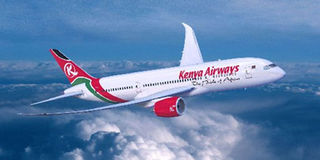Kenya Airways a huge liability to the taxpayer

A Kenya Airways plane in flight.
The revelation by the Parliamentary Budget Office (PBO) that Sh38.86 billion will be spent in the 2022/2023 Financial Year on keeping the cash-strapped Kenya Airways (KQ) afloat is not only disheartening but saddening and repugnant. Besides the Sh36.6 billion bailout national government bailout for the national carrier is Sh2.26 billion for interest on a debt guarantee.
KQ, founded in 1977 following the dissolution of East African Airways, has for the past nine years in a row made unprecedented financial losses, gobbling up taxpayer funds totalling Sh144.64 billion.
Among the 18 financially indebted state-owned enterprises that require Sh1.3 trillion in bailouts, it is predicted that Sh83.1 billion will have been spent on KQ in 2020/2021 and 2022/2023 fiscal years. While the management has attributed the dip to travel restrictions due to the Covid-19 pandemic, the uncertainties and insecurities brought on by the Ukrainian war and the spike in fuel prices, there is more than meets the eye.
Even before the coronavirus and Russia’s invasion of Ukraine, KQ Carrier, for instance, posted a Sh7.55 billion net loss for the year ended December 2018 and, in 2016, it got a Sh20 billion government bailout through the Supplementary Budget. Worse, in the financial year ended March 2016, the airline made a Sh26.2 billion loss.
Also during the 2014/2015 fiscal year, which ended in March 2015, KQ made a Sh25.7 billion loss. For that, the management blamed Western travel advisories; the Ebola outbreak in West Africa; and dismal performance of the Kenya shilling against international currencies, especially the dollar, among other excuses.
Blame games
The truth is, KQ management has been accustomed to blame games and goal shifting. In the meantime, the elements of maladroit financial mismanagement, lack of integrity and maladministration are swept under the carpet.
The proclivities for the management to spend shareholder funds in white-elephant projects and a deepening level of corruption have contributed significantly to the lamentable state of affairs. Precisely, KQ has become an economic albatross to the taxpayers, thus an impediment to economic re-invigoration.
It is high time the ‘Pride of Africa’ addressed such vital issues as money-wasting projects, discretionary costs, numerous operational delays and poor airport experience at JKIA to enjoy a healthy cash flow like other world-class airlines.
Last, but not necessarily the least, those responsible for the imprudent financial management, misappropriation and profligate expenditure should be shown the door and brought to book. Otherwise, KQ will continue to be a thorn in the flesh of the economy and a liability to the taxpayers for a long time to come.
An ounce of prevention is worth a pound of cure.
Mr Muthama is a business and strategic management lecturer at JKUAT, consultant and author. [email protected].





